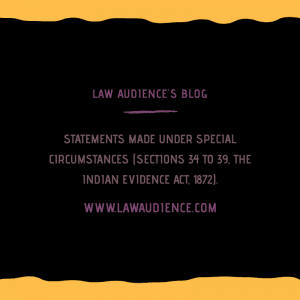THE CONCEPT OF MEDICAL NEGLIGENCE UNDER THE LAW OF TORTS, CRIME, CONTRACT, AND CONSUMER PROTECTION ACT[1]
ABSTRACT
It is essential to know that what basically considers as a medical negligence. A Patient approaches the doctor because the patient thinks that the doctor has good skills and is an expert in his field. So, he will get the best treatment and his health problem will be cured. If there will be any deficiency in performing his duty then it will result in negligence. In this, the relationship between the doctor and patient takes the shape of a contract recollecting the important elements of Tort. A doctor has certain duties towards his patient and if there will be any breach of duty then it will be considered as negligence from the side of the doctor. Before doing any type of test it is the duty of the doctor to take the permission or consent of the patient or his legal heirs as the case may be. The services rendered by a doctor towards his patient or client falls within the ambit of the Consumer Protection Act, 1986. The Medical Profession is regarded as a prestigious profession as it helps in saving the life.
IS MEDICAL NEGLIGENCE A MEDIUM TO MEDICAL MALPRACTICE?
INTRODUCTION
The meaning of negligence has not been described properly but by the word negligence, we can say that it is an act imprudently done by a person resulting in enforceable damages to the other. Negligence is an offence which falls under the ambit of Indian Penal Code, Law of Tort, Indian Contract Act, and Consumer Protection Act or under any other law for the time being in force.
Presently, medical negligence has been one of the increasing issues because it has led to many deaths and even unfavorable effects on the health of the patients. The article here focuses on explaining Negligence, Medical Negligence, and the Landmark Cases involved under it especially in India. Through this article, author’s aim is to create awareness among people about the concepts of Negligence & Medical Negligence.
MEANING OF NEGLIGENCE
Under the Law of Tort, there are various definitions of negligence. According to Winfield negligence, it is the violation of any legal duty which results in damage and loss which is given by the defendant to the plaintiff. It is essential that the misconduct has caused harm or damage to the person, if there is no damage then there is no negligence.
In King v. Phillips[2], When there was a direct harm which is done with the plaintiff then the question of negligence arises because of the misconduct and harm did by the defendant.
NEGLIGENCE AS A TORT, CONTRACT, AND CRIME
Under the Law of Tort, it is considered as a civil wrong. In a tort, duties are provided by the law and such duties are owned in rem which means the people at large. Such wrongs can be fulfilled by paying unliquidated damages. Under some cases, the coincident liability may exist for example doctor and patient relationship is considered as a contract and if any mistake is done by the doctor then he would be liable for such mistake. A Contract may be express or implied. If there is no agreement between them but still it will be deemed that the doctor will exercise his proper skills for the care of a patient. Under tort, negligence is calculated on the basis of damage but if we talk about negligence under the Law of Crime then it depends upon the degree or extent of negligence. Under criminal negligence, the onus of proof generally lies on the person who is claiming it. Under criminal law, the first essential element is mens rea i.e. guilty mind.
TYPES OF NEGLIGENCE
- GROSS NEGLIGENCE: It means the total ignorance which is done by the concerned person. It is a type of negligence which is a step near than taking simple carelessness.
- COMPARATIVE NEGLIGENCE: Under this negligence, the plaintiff is slightly responsible. In this, the plaintiff also has to pay a sum of damages.
- CONTRIBUTORY NEGLIGENCE: In contributory negligence, the plaintiff is equally responsible for the injury caused to him and therefore he cannot claim damages.
- MIXED CONTRIBUTORY AND COMPARATIVE NEGLIGENCE: This type of negligence is a composition of both above-mentioned forms of negligence.
- VICARIOUS LIABILITY: Under this liability, the defendant is liable for the acts of another person.
NEGLIGENCE BY PROFESSIONALS
These are persons who are professional in performing their jobs and who are trained in a particular area and carries the responsibility of doing their work with due care. These people include architects, doctors, and lawyers. The Hon’ble Supreme Court explained the meaning of professional in the case Jacob Mathew v. State of Punjab 2005 (6) S.C.C. (India).
MEDICAL NEGLIGENCE
The profession of a doctor includes full knowledge and good practice of his field. It is the duty of a doctor to take care of his patient. The reasonable care is depending upon the various types of profession. Basically, a surgeon can be regarded as an average practitioner whereas in case of specialist a higher amount of scale is needed. An act of doctor leading to harm to his patient leads to medical negligence. If a doctor despite his skill and practice or in lack of skills and practice causes negligence towards his patient which leads to the death of the concerned person than the doctor is liable for the breach of his duty under medical negligence.
In Shishir Rajan Saha v. State of Tripura[3], In this case, there was a patient in the government hospital and because of a doctor’s improper care patient suffered a lot. The Court ordered the doctor to pay compensation to the patient.
The main duty of a doctor is:
[1] To decide whether to undertake the case or not;
[2] What treatment to be provided;
In the case of gross medical negligence, the principle of res ipsa loquitor is applied.
In Gian Chand v Vinod Kumar Sharma[4], the Court held that if a patient is shifted from one ward to another continuously in spite of the need of instant treatment, which results in harm to the patient then the doctor and the administration is considered liable under negligence.
MEDICAL NEGLIGENCE AND CRIMINAL LAW
Under the Criminal Law, for committing any offence the necessary element is mens rea which means the person having a guilty mind. After proving mens rea the concerned person will be considered as a criminal.
SECTION 304-A OF INDIAN PENAL CODE
This section says that whenever an inadvertent act is done by any person by using any type of instrument or vehicle and which results in causing the death of the other person shall be termed as death caused by negligence. Under this section, the maximum punishment is 2 years of imprisonment, fine or both. As in some hospitals the doctors performing surgery under the influence of drugs or alcohol through which the patient has to suffer.
MEDICAL MALPRACTICES
It occurs when the health care provider disregard to give proper treatment to the patient or any substandard treatment due to which the harm or death is caused to the patient. This law provides the patient to claim compensation to the patient if any mistake is done by the doctor.
In the United States according to the medical malpractice center, there are 15,000 and 19,000 cases are filed every year.
MEDICAL NEGLIGENCE UNDER CONSUMER PROTECTION ACT, 1986
Under the Consumer Protection Act, 1986 the patient is considered as a consumer and the doctor is considered as a service provider. However, under some circumstances, the relationship of consumer & service provider may not exist and this is because when the patient does not pay for the service which is given by the doctor.
WHAT SHOULD A MEDICAL DOCTOR KNOW ABOUT COPRA?
WHO IS CONSUMER (SEC (1) (d))
Any person who buys any goods by paying some consideration will be considered as a consumer. If those goods are bought for resale or commercial purpose then it will not be cover under the definition and cannot claim under this act.
WHAT IS SERVICE (SEC 2 (1) (o))
Service includes any type of service which is given to the consumer after paying some consideration but it will not include those services which are availing free of cost.
DEFICIENCY OF SERVICE
It basically means any type of service provided by the seller to the consumer having fault and shortcoming in it.
WHAT IS A COMPLAINT
A complaint is a grievance which is made by a complainant and it must be in writing i.e. a consumer who has suffered any damage or any loss.
WHO CAN FILE A COMPLAINT?
Under the Companies Act, 1956 any consumer or any consumer association which is registered can file a complaint. However, it is not necessary that the consumer is a member of such organization or not.
WHERE IS A COMPLAINT FILED
A complaint can be filed in-
- District Forum – Under the Sections 11 and 12 of the Consumer Protection Act, 1986 any person can make a complaint if the value of the goods and the compensation claimed is less than 20 lakh rupees.
- State Commission – Under Section 16 any person can file a complaint if the compensation claimed is not more than 1 crore rupees.
- National Commission – If the value of goods and services is more than 1 crore rupees.
RIGHTS OF CONSUMER
- Right to get protection against hazardous goods.
- Right to get information about the quality and quantity of the goods.
- Right to purchase goods at a reasonable price.
- Right to be heard.
- Right to seek redressal.
- Right to consumer education.
DEFICIENCY IN SERVICES AMOUNTING TO NEGLIGENCE IN CONSUMER PROTECTION ACT
Under any profession, there is a need for practice whether it is a field of medical, teaching, law etc. The more practice will be done by the professionals the more expert they will become. In a renowned case, Indian Medical Association v. V.P. Shantha and Ors[5] – There was a question before the Hon’ble Supreme Court that whether the medical practitioner who is giving services can be claimed for deficiency in service under the Consumer Protection Act, 1986.
CONCLUSION
Through this article, author doesn’t want to disrespect or criticize doctors and their profession. But, however, the author would like to bring it into the notice of the readers that the Medical Profession is very sensitive as it requires a great sense of responsibility and knowledge to take care of the patient. The relationship of doctor and patient requires appropriate care. The doctors are obliged to do care of their patients. Many doctors and even specialists sometimes just for making money neglect their patients and even cause serious injury or harm to their life. So, there is a need for a vigorous law to guide the working standards of medical practitioners.
[1] Authored By: Ms. Kajal Kukreja, LL.B, Final Year Student at New Law College, Bharati Vidyapeeth Deemed University & Research Writer at Law Audience: Edited By: Mr. Varun Kumar (Founder & CEO & Editor-In-Chief).
[2] (1953) 1 QB 429: (1952) 2 All ER 459.
[3] A.I.R. 2002 Gau 102 (India).
[4] A.I.R. 2008 HP 97 (India).
[5] A.I.R. 1996 S.C. 550: (1995) 6 S.C.C. 651 (India).



